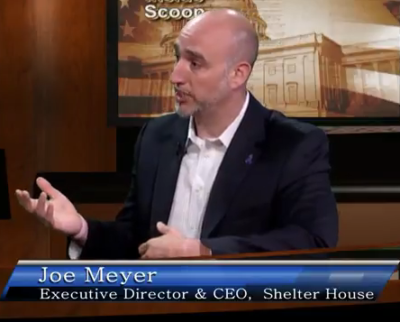Shelter House – Joe Meyer
(Apr. 2, 2018) Catherine Read interviews Joe Meyer, Executive Director and CEO of Shelter House, serving homeless families and victims of domestic violence in Fairfax County. Shelter House aims to break the cycle of homelessness by providing crisis intervention services, temporary housing and social services to promote self-sufficiency for their clients. He oversees the operations of two family shelters, the Katherine K. Hanley Family Shelter in Fairfax and the Patrick Henry Family Shelter in Falls Church. Additionally, Meyer oversees the Artemis House, a home specifically operated for women fleeing domestic violence. Shelter House received the 2017 Nonprofit of the Year award from the Northern Virginia Chamber of Commerce.
Approximately 60% of the people who come to Shelter House are the working poor. They are often working low wage jobs on a full time basis, but are still not able to make ends meet. In Fairfax County, approximately 1000 people are homeless on any given night, and over half of those people are children. A decade ago Fairfax adopted a 10-year plan to eliminate homelessness. Through successful programs like Shelter House, Fairfax has cut homelessness by 50%, but Meyer notes that there is still quite a bit of work to be done. Dean Klein is currently the head of the Office to Prevent and End Homelessness in Fairfax County. He has built partnerships with over 20 organizations that work together to provide support and services to the most vulnerable in the community.
Meyer shares that Shelter House follows the philosophy of “housing first”. The aim is to break down the housing barrier for clients, and help them get into a stabilized environment. The average shelter stay for a family is 65 days. Once the family is settled into a permanent housing, then social workers begin to help the family become self sufficient. In an expensive area like Northern Virginia, one might imagine that it is difficult to find an affordable place to live on a small budget. Shelter House has specialists on site who work with a network of landlords who have agreed to take in families at discounted rates, as long as they are receiving support and backing from Shelter House.
These partnerships with landlords, business owners and community leaders are critical to making programs like this thrive. In addition to landlord arrangements, Shelter House works with employers who are willing to hire and train workers. These wrap around services that are being provided give families the opportunities they desperately need to break the cycle of homelessness and be able to thrive independently. In addition to giving the families the dignity of having their own home, providing services in this manner is far less expensive then keeping families in institutional homeless shelters.

Finally, Meyer shares that Shelter House is holding its 5th annual benefit breakfast on Thursday April 12th at Westwood Country Club in Vienna. The event is sold out, but Meyer encourages anyone who would like to attend to visit their website and get on a waiting list. Additionally, if you are a landlord or an employer that would like to get hooked up with Shelter House, he encourages you reach out and make a connection. They are always seeking out business and community leaders to partner with. Shelter House also welcomes various groups like scouts, schools and community youth groups who would like to run collection drives or come in to run programs with the children at the shelter. Food, diaper, and feminine product drives are all welcome, along with hosting a monthly birthday party for children at the shelters. BRAWS and The Pajama Program are one of many partnering organizations. Any donation of time or money is greatly appreciated. If you, or a group you are affiliated with would like to get involved please reach out and you will be connected with the appropriate staff.